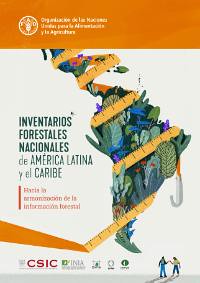21 Latin American and Caribbean countries work together to harmonize National Forest Inventories
Experts of National Forest Inventories in Latin America and the Caribbean launched a publication to improve the transparency and credibility of forest information.
The book, National Forest Inventories of Latin America and the Caribbean: Towards the harmonization of forest information, is the result of the work of 21 countries of Latin America and the Caribbean (LAC) that have combined their efforts to compile, review and illustrate their experiences implementing National Forest Inventories (NFI), as well as identifying common points and differences in the definitions, designs, methods and estimation protocols applied in those countries.
NFIs are the fundamental pillar of a multipurpose National Forest Monitoring System (NFMS), providing precise information on the extension, distribution, composition, condition of forests and the changes that occur in these areas over time. Field measurements of NFIs provide data on land use and land cover. This information, combined with the data obtained from remote sensing, is the basis for producing robust estimates and maps on deforestation, forest degradation, sustainable forest management and the restoration of natural ecosystems and productive systems.
This publication seeks to promote the transparency of forest-related data to better inform international policy agendas and reports, such as the United Nations Framework Convention on Climate Change, the Convention on Biological Diversity, the Convention of the United Nations to Combat Desertification and the United Nations Decade on Ecosystem Restoration.
The countries of the LAC region developed this publication with the support of the United Nations Food and Agriculture Organization (FAO), the Institute of Agricultural and Food Research and Technology of Spain (INIA), the Federal University of Amazonas (UFAM) of Brazil, the Forestry Institute of Chile (INFOR), and the European NFI Network (ENFIN).
The book is the first product of a work plan on harmonization of prioritized forest variables in this region. This process aims to improve the transparency of data generated by the participating countries and share experiences with the Global Forest Resources Assessment.

Argentina, Bahamas, Belize, Brazil, Chile, Colombia, Costa Rica, Ecuador, El Salvador, Guatemala, French Guyana, Guadeloupe and Martinique, Honduras, Jamaica, Mexico, Nicaragua, Panama, Peru, Puerto Rico, and the Virgin Islands of the States United States, Dominican Republic, Suriname, and Uruguay; were the countries that participated in this ambitious publication.
The book was launched during a virtual event with the participation of the forestry directors of Argentina, Chile, Ecuador and Mexico and the Coordinator of the National Forest Inventory of Honduras. The forum was moderated by Iciar Alberdi, member of the Steering Committee of ENFIN.
For Mette Loyche Wilkie, Director, Forestry Division at FAO, the process of developing this book increased South-South cooperation in LAC, through exchanges of technical and scientific information, to ensure coherence of reports related to forests with international agreements, and motivated FAO partners to continue supporting these processes.
Carla Ramirez Zea, a FAO Expert in National Forest Monitoring and Inventories, highlighted that this work demonstrates the commitment of LAC countries to educate and report quality forest data that informs sustainable management and conservation of forests, and benefits rural and urban communities.
Fernando Raga, Director of the Forestry Institute of Chile, said that it is essential to diagnose the state of the world’s forests as accurately as possible, as well as to have the capacity to monitor changes. On the other hand, Martín Monaco, National Director of Forests of the Ministry of Environment and Sustainable Development of Argentina, expressed that the quality and credibility of forest information are very important concepts for decision-making that is carried out at large scales and time frames.
The publication of this book offers the opportunity to build a common base of consistent forest indicators at the regional level, said the Director of the Mexican Forestry Commission, Luis Meneses Murillo. The Director of Forests of the Ministry of Environment, Water and Ecological Transition of Ecuador, Silvana Chulde, spoke about the importance of strengthening the network of NFIs in the region, because it will create a common endorsement and objective in the search for funding for the maintenance of the NFMS, framed by national, regional and global regulations.
The coordinator of the National Forest Inventory of Honduras, Betina Salgado, highlighted that NFIs are designed with solid statistical bases at the national level, and include quality assurance programs, before, during and after field measurements, to guarantee the reliability of the data.
The virtual event was closed by Anssi Pekkarinen, who highlighted that collaboration in the harmonization of NFIs is very valuable to improving the consistency and comparability of global data on forest resources. The event and the publication received funding from the FAO CBIT-Forest project through the Capacity-Building Initiative for Transparency (CBIT) trust fund of the Global Environment Facility (GEF).
This post was originally featured on the FAO Regional Office for Latin America and the Caribbean webpage: https://www.fao.org/americas/noticias/ver/en/c/1458724/
